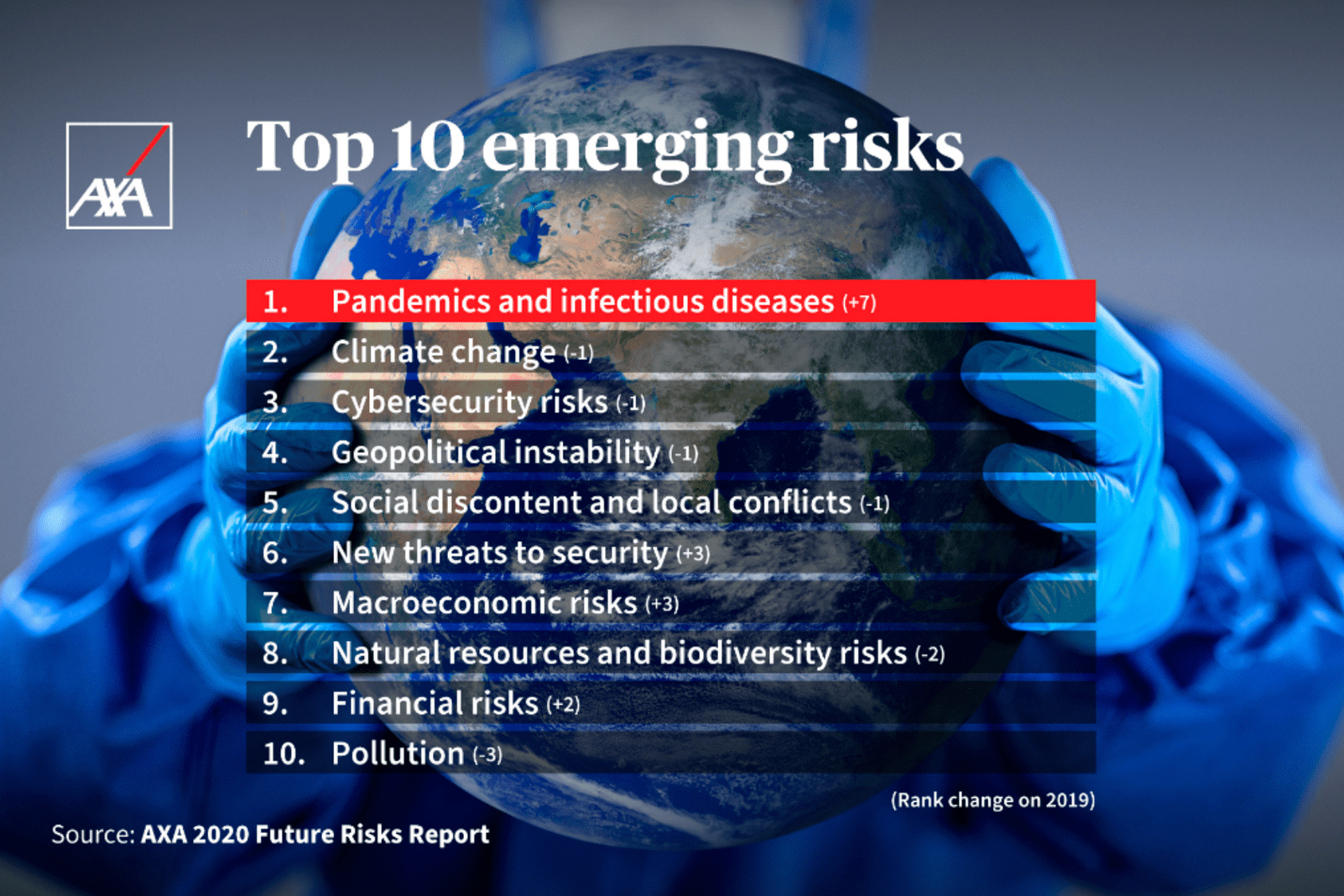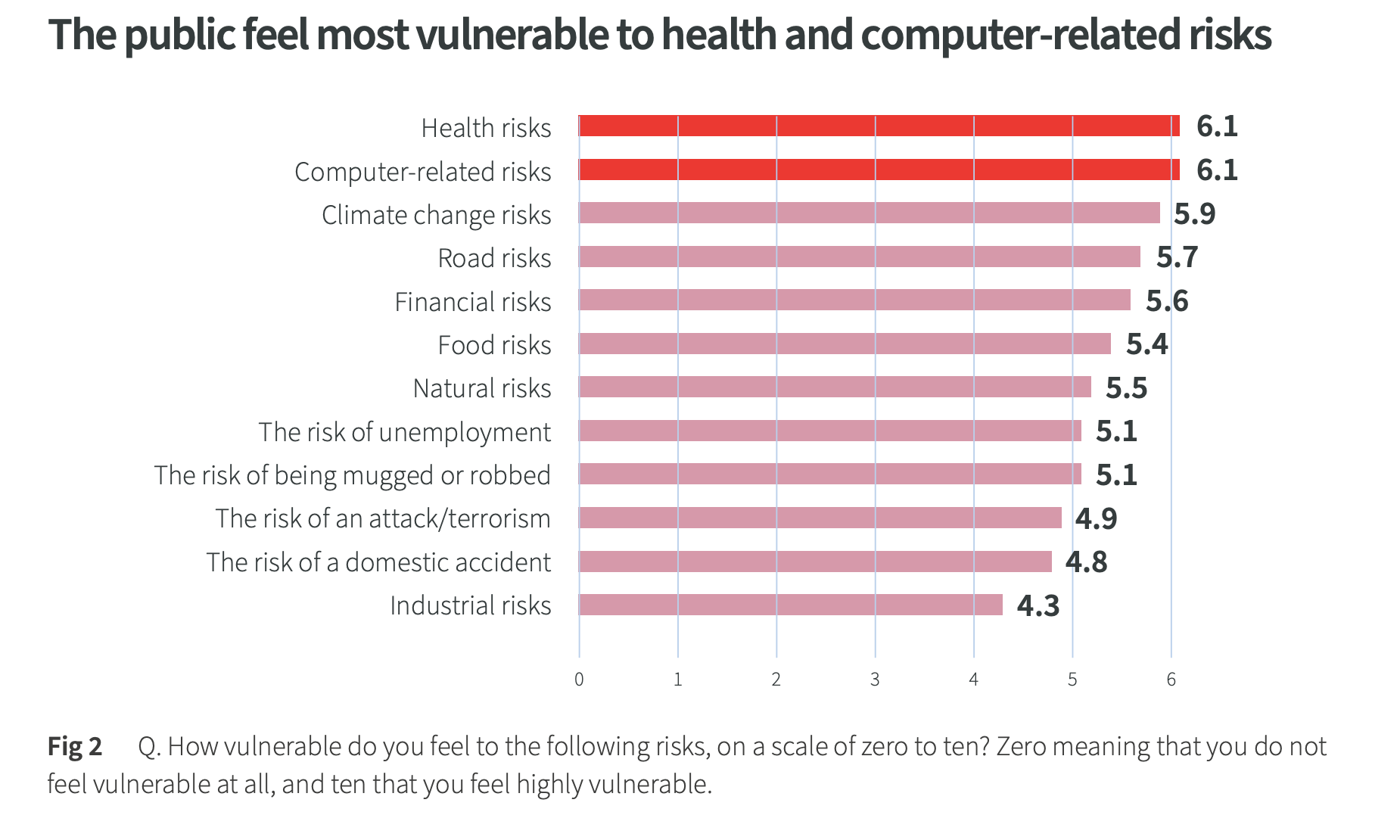Top three risks – health, climate, cyber risks
Anyone who has insight into the risks and trends of tomorrow will remain relevant to their customers. In its annual 'Future Risks Report', AXA Group analyses the global perception of emerging risks. We question both experts and the general public. It will come as no surprise that health is now a top priority. But which insights does the research reveal that are important for your organization?

Covid-19 is redrawing the risk landscape
Covid-19 raised awareness about health risks around the world. But the pandemic is also accelerating the emergence of other threats.
- Cyber risks are on the rise due to increased e-commerce, online communication and teleworking.
- Mental disorders are triggered by social isolation and financial insecurity (with the number of Europeans who feel bad tripling).
- Geopolitical instability is growing and local tensions are growing due to growing economic and social inequality.
- We are seeing unprecedented rises of government debts, while economies are staggering, because uncertainty is making families spend less.
All these threats seem less acute than the health risk, but they are no less serious. They are actually strongly linked and more complex than ever. All of these factors could ferment into the next crisis, especially if they are overshadowed by the fight against Covid-19. For example, it is alarming that risk experts all over the world (except in Europe) consider climate risks to be less of a priority this year than they did in the one before.
Top 10 Emerging Risks
The surveyed experts put pandemics and infectious diseases, climate change and cyber risks in the top three of most threatening risks. The man or woman in the street is most aware about his or her health and cyber security.
- Pandemics and infectious diseases are top priority. According to risk experts, they pose the greatest threat to our society for the next five to ten years. The general public also feels this way. There is a danger that the focus on Covid-19 will reduce attention on other health issues. While factors such as antibiotic resistance and super viruses actually hold the seeds of the next global health crisis.
- Highest state of readiness for cyber risks. Both experts and citizens estimate the cyber risk to be high. With the rapid shift to online business and e-commerce, the number of cyberattacks has also increased effectively in recent months. Cyber criminals took advantage of the growing concern surrounding Covid-19 to deceive people, resulting in a 600%1 increase in phishing emails between February and March 2020. Susceptibility to cyber risks is increased by the rising use of personal devices with lower cybersecurity, both in teleworking and distance learning.
- Mental health is another candidate for a global crisis. Mental health problems still remain somewhat under the radar of risk experts but in the aftermath of Covid-19, this may become the number one threat. The United Nations predicts that the pandemic could dramatically increase the number of depression cases and suicides, resulting in a global mental health crisis affecting children, youth and health workers. The survey showed 58% of respondents indicating that, in fact, the emerging risks have or will have an impact on their mental health. The trauma of the disease, social isolation and economic insecurity are already leading to more anxiety and depression.
Yet, government investment in prevention and treatment of mental health problems is not keeping up with needs. Countries spend on average only 2% of their health budget on mental health3. And thus, 81% of risk experts do not believe that governments are sufficiently prepared for the rising numbers of mental health problems.


Three quarters of Belgians feel vulnerable
Almost three in four people feel they are more vulnerable today than they were roughly five or ten years ago. Fear and risk avoidance inhibit their consumption, their behaviours and their decisions. For example, 81% say the risk threat affects their travel plans.
At first glance, it seems difficult for many organizations to remain relevant to customers in these highly changed circumstances. However, we believe it also opens up perspectives on providing appropriate solutions and creating positive customer experiences even more than ever. Organizations that succeed in this, and thus instil peace of mind and confidence, will rise up from this period with more resilience.
Read about how Sunweb Group offers virtual doctor consultations as an in-app service to its travellers, for example. Or how a 24/7 hotline can provide psychological counselling on cyberbullying.
Perhaps you have some questions? If so, please feel free to contact us and let us explain how you can offer your customers relevant assistance and tools for facing existing and emerging threats with confidence.


